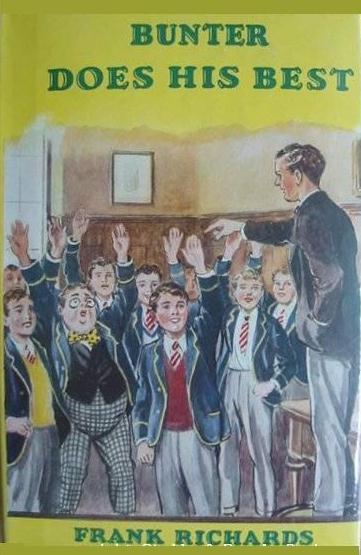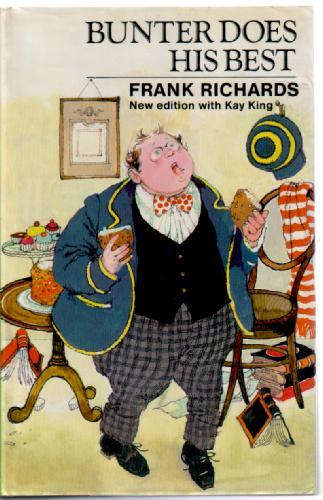
Bunter Does His Best by Frank Richards.
Published September 1954 Charles Skilton (Reprinted 1955 twice, 1957 and 1963)
Illustrated by R. J. MacDonald.

In this reader’s view, one of the best post war Bunter books ever written. The title of chapter one is almost Wodehousian in its magnificence. “Tribulations of a Football Captain.” Almost as good as my all time favourite – from “Thankyou Jeeves” – “Development of the Butter Situation”
Wharton is in a dilemma. And what a dilemma it is. As usual, dialogue is used to introduce the situation, and throughout, the use of explanatory narrative is minimal. No concession is made for new readers, unfamiliar with Harry Wharton & Co.
Bob Cherry is crocked, his knee damaged. He tells Wharton that he will be “all right for the Rockwood match later on.” Wharton argues that that is no help against Wednesday’s Courtfield game. Brown has a cold, we are told, & Linley’s gone home. Nugent has had to replace Penfold, and it looks like Trumper’s gang is going to “run all over us.”
Regular, devoted readers of The Magnet would have had no difficulty understanding this. But what did new readers make of it? One would have thought that this breezy throwing down of names, and the assumption that the reader was following Wharton’s plight would have confused any newcomer before he’d arrived at page 3.
I suppose it must have been about 1964 I first read this book, around ten years after it was published. Was I a remarkably perceptive child reader, or was Frank Richards, in fact, a great writer?
It certainly hooked me then, & it continues to do so to this day!
This is the story of a power struggle between the two leviathans of the Greyfriars Remove, Harry Wharton & Herbert Vernon-Smith. The essence of The Novel is conflict. And here, conflict rears it’s head in the opening pages.
The major source of difference between the proud, slightly priggish, but upright leader of men that is Wharton, and the arrogant, domineering, & assertive Bounder was their similarity. Squiff, Mauly, Brown, Cherry, Todd; all had their qualities, but only Wharton and Smithy had the power to command in the Remove.
 I think most of us are know what the argument was. Smithy was needed in this
weakened team as he had never been needed before. He chose this particular
occasion to loftily announce that he had a prior engagement, and it was clear
that he regarded Courtfield County Grammar School as not worthy of his weight.
Wharton had no choice but to accept this, but Smithy was told that if he let the
team down now, he would not play in any junior eleven team that Wharton
captained again.
I think most of us are know what the argument was. Smithy was needed in this
weakened team as he had never been needed before. He chose this particular
occasion to loftily announce that he had a prior engagement, and it was clear
that he regarded Courtfield County Grammar School as not worthy of his weight.
Wharton had no choice but to accept this, but Smithy was told that if he let the
team down now, he would not play in any junior eleven team that Wharton
captained again.
The Removites struck back, and, after Smithy had had his head held under the tap he agreed to change his mind & play. The fact that the Remove took such drastic & draconian action appealed to his vanity. Unpleasant as their actions were, it proved how valuable & important he was.
The naïve & innocent Removites thought the problem was solved. But they had not reckoned on Wharton’s pride. Slowly, but inevitably, the leading players resigned from the team.
Wharton is reduced to playing Bunter in the team. Interestingly he hunts out Elliott & Smith mi. Elliot had actually left Greyfriars in The Magnet days, and both had not been mentioned for years. And were never to be again. Also, interestingly, Frederick Stott asserts himself against Skinner and agrees to play.
To Smithy’s amusement, and glee, the match is a disaster. Trumper’s “bunch of townies” walk all over them.
One of the halves, in fact – a very fat one – spent most of his time sitting on the ground and panting for breath. But contact with Mother Earth did not have the effect on Billy Bunter that it had on Antaeus of old. Every time he went down the fat owl was slower in getting up.
The match is lost 7 – 1.
Smithy gets his wish. Wharton is deposed as captain, and, at an election in which Bunter votes with both hands (see cover picture) he is elected as the new captain of the form.
Skinner & Co, and Bunter are in for a shock. They find the new captain even worse than Wharton.
Vernon-Smith is no fool. He knows there is only one way to win matches and thus maintain his newfound position & popularity.
In a curiously moral way, retribution catches up with him. He is blamed for something he hasn’t done, and gated for the term. This leaves the form with no option but to ask Wharton to captain the matches again.
Schoolboy fiction this may be, but the dilemmas and moral decisions made by the leading players are complex and open to discussion.
Smithy bribes Bunter to “confess” to the crime he, Smithy, was accused off. This seems to pay off. Quelch, who considers the fat owl noble in thus preventing an “innocent” boy being punished, deals with Bunter lightly. Smithy regains his position as team captain. Skinner, the real culprit, is amazed that Bunter has confessed. And, Wharton is back where he started.
There is however, at Greyfriars, as in real life, a Greater Authority to contend with. It matters not one jot to Mr Quelch, or Dr Locke who captains the junior eleven, or how that captain got elected. This is a matter for the form, & the form alone to decide.
But, it matters greatly who hurled a bag of flour at a beak. And, it matters even more if one boy coerces, through bribery, another, less intelligent boy, to falsely confess. This is a serious offence against Constituted Authority!
All would have been well, had not Bunter blabbed, unwisely, at the wrong time. The matter comes to Quelch’s ears. To Quelch, & the Head, the Bounder’s claim that he was innocent of the first offence not only sounds unlikely, but it pales into insignificance when compared to the second.
Happily, Wharton & Co learn the truth, and Skinner is “encouraged” to confess. This somewhat mitigates Smithy’s guilt.
Still more happily, there is a lot of good stuff in Smithy, and he admits that having made a “ghastly muck” of things it is only right that he should resign.
Was Wharton right to refuse to re-admit Smithy to the team? Did he mistake stubborn pride for just integrity and leadership? Was Smithy right to bribe Bunter into confession?
This superb story deals with conflict realistically, morally, & believably. This is a ten out of ten Bunter story, &, if you read no other post war Bunter, you must read this one.